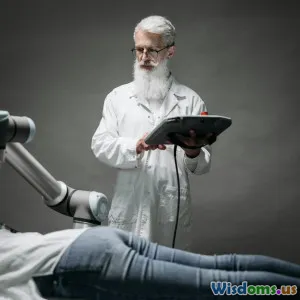
Advancements in Health Diagnostics
8 min read Explore the latest advancements in health diagnostics, shaping the future of medical screenings and early detection. (0 Reviews)
Advancements in Health Diagnostics: A Leap Toward Precision Medicine
In the realm of healthcare, diagnostics play a pivotal role. Accurate and timely diagnoses can mean the difference between treatment and severity, or even life and death. With the rapid advancements in technology, health diagnostics are evolving at an unprecedented pace. This article explores the latest developments in the field—from Artificial Intelligence to molecular diagnostics—creating a revolutionary approach to patient care and management.
The Shift from Reactive to Proactive Diagnostics
Traditionally, diagnostics have been reactive. Patients visit healthcare providers with visible symptoms or after experiencing critical health events. This model often results in late-stage disease detection. However, advancements in health diagnostics are pushing a proactive approach.
For instance, AI algorithms are now adept at predicting diseases based on patient data, using vast datasets to identify patterns that may elicit early signs of potential health issues. A landmark study published in Nature Medicine indicated that AI could outperform human radiologists in detecting early signs of breast cancer, showcasing a significant leap toward proactive screening.
Artificial Intelligence in Diagnostics
The integration of AI technologies in diagnostics is leading to major breakthroughs. AI-enabled devices and software can analyze complex medical data far more swiftly and accurately than traditional methods.
Imaging Diagnostics
In imaging diagnostics, such as X-rays, CT scans, and MRIs, AI systems have been trained to recognize anomalies far beyond the human eye. For instance, Google’s DeepMind developed an AI system that can diagnose over 50 eye diseases from retinal scans with remarkable accuracy. This technology allows for quick intervention that can prevent blindness—demonstrating how AI can enhance diagnostic accuracy in critical care.
Pathology and Computational Modeling
AI is also transforming pathology. Algorithms capable of analyzing cancerous tissue samples can identify subtle distinctions in cellular compositions that indicate malignancy or benignity. On top of that, platforms such as PathAI provide pathologists with decision support that optimizes accuracy while minimizing oversight. Such advancements are vital for personalized treatment plans, as they assist in tailoring therapeutic methodologies per patient based on their specific disease markers.
Lab-on-a-Chip Technologies
The emergence of Lab-on-a-chip devices is another incredible advancement in health diagnostics. These diminutive devices integrate multiple lab functions onto a single chip, allowing for rapid and efficient testing.
Portable Diagnostics
For example, the biochip technologies utilized in point-of-care testing can analyze blood samples, infectious agents, or genetic material within minutes. Companies like Theranos attempted to revolutionize this concept, albeit with a rocky history; however, advancements continue to fuel innovation. Modern devices successfully deliver diagnostic results for chronic diseases like diabetes via simple glucometers or instant diagnostic tests for various infections.
Applications in Infectious Diseases
The COVID-19 pandemic underscored the importance of rapid diagnostics. Companies and researchers raced to develop quick tests, with breakthroughs seen in PCR and antigen testing technologies that provided results in under an hour. Rapid antigen tests became critical tools, enabling mass screenings across communities. These technologies reflect a necessary public health evolution, enhancing infectious disease control.
Molecular Diagnostics and Genomics
Another cornerstone of advancements in diagnostics is molecular diagnostics—an area encompassing a myriad of techniques to assess genes, proteins, and metabolites.
Next-Generation Sequencing (NGS)
Next-Generation Sequencing technologies have democratized genomic profiling by enabling rapid sequencing of entire genomes at a fraction of the cost of previous technologies. This development facilitates comprehensive genetic tests that can inform treatment strategies across various illnesses.
For instance, oncology has greatly benefited from genomics, with applications such as targeted therapies derived from an individual’s genetic makeup, enhancing treatment efficacy while minimizing side effects. Initiatives like Genomic Medicine are at the forefront in utilizing these advancements, studying genetic information shared through global databases that could personalize chemotherapy protocols.
Liquid Biopsies
Liquid biopsies represent a cutting-edge molecular diagnostic tool. Instead of invasive tissue sampling, these blood tests can detect circulating tumor DNA (ctDNA) and provide comprehensive insights into a tumor's genetic status. Companies like GRAIL are spearheading developments in this domain, with their multi-cancer early detection test showing how liquid biopsies can revolutionize cancer screening by identifying asymptomatic forms of the disease.
Mobile Health Diagnostics and Telemedicine
The convergence of mobile health (mHealth) and telemedicine has brought about significant shifts in health diagnostics, offering a new dimension for patient monitoring and care delivery. The proliferation of health apps and wearable devices has enabled individuals to track their health metrics continuously.
Wearable Devices
Smart wearables like the Apple Watch now come equipped with features that can monitor heart rates, detect falls, and even conduct ECG readings. Such devices represent a fusion of diagnostics into daily life, allowing for continuous health monitoring. Research illustrates that early detection of anomalies through wearables could prevent acute episodes of heart disease, further emphasizing the importance of early diagnostics in maintaining health.
Telehealth Expansion
Telehealth platforms have expanded access to specialists, allowing for remote diagnostics consultation. The barriers of geographic limitations are being dismantled as patients can attend face-to-face diagnostics with healthcare providers through virtual platforms. This convenience encourages individuals to seek medical advice as symptoms arise, again underscoring a proactive approach in healthcare.
Conclusion: The Future of Health Diagnostics
Advancements in health diagnostics are transforming the landscape of healthcare, paving a way for integrated, personalized, and proactive patient management. From AI developments to molecular diagnostics and enhanced public health strategies, these innovations signal a momentous shift toward early disease detection, efficient healthcare delivery, and improved outcomes.
As we move forward, the importance of continuously investing in such technologies cannot be overstated. Not only do they hold the promise of better diagnostics, but they also signify a potential cultural shift—where patients are partners in their healthcare journey. By staying informed, advocating for access to these technologies, and embracing a proactive health culture, we can navigate the evolving frontier of healthcare together.
Rate the Post
User Reviews
Popular Posts




















